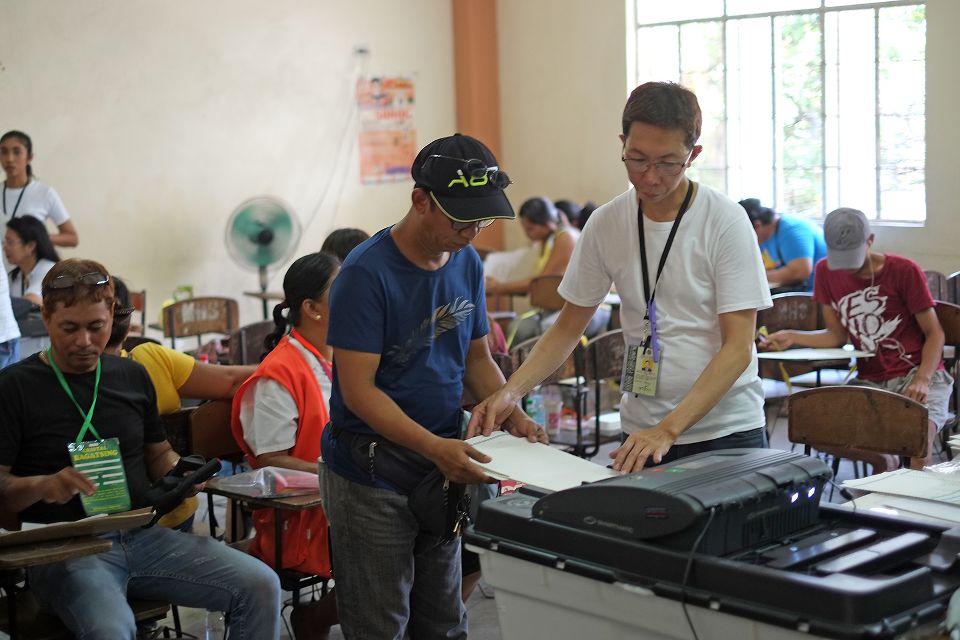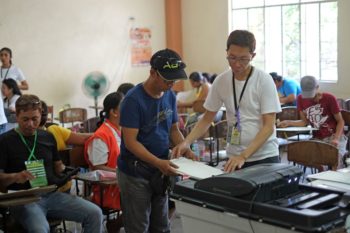 A voter is helped by an election worker as he casts his vote during mid-term polls in Manila on May 13, 2019. (CBCP NEWS)
A voter is helped by an election worker as he casts his vote during mid-term polls in Manila on May 13, 2019. (CBCP NEWS)
2019 Midterm Elections in perspective

A voter is helped by an election worker as he casts his vote during mid-term polls in Manila on May 13, 2019. (CBCP NEWS)
To shed us light on his perspective of the said elections, Former RTC Judge Jesus Quitain gave his two cents on the matter.
What’s new?
According to Quitain, in the local scenario, this election is totally a new face than what it was 60 years ago.
“This election is different from the 1959 local elections. Sixty years ago, there was a two-party system. Back then, incumbent Carmelo Porras fought against Gaudioncio Tiongco for Mayor. These two groups had the complete lineup of 12 councilors. The election was at large, unlike today that there are three districts. At that time, the election is held every second Tuesday of November, different from Monday of May today,” he said.
“Also, sixty years ago, with the absence of cellphones, transistor radio, only obsolete television, Davao was really zero. So, it took time before the public could get information who really won,” he added.
The transmission of the election returns has been made way faster because of the advent of automation.
“Far-flung barangays would also find a hard time transmitting results because roads were non-existent yet. The counting would start by Tuesday night but the results will usually come out after three days,” he recalled.
“For example, in 1963 elections, Councilor Bebeng Bangoy, in the first two days of the counting, he was really outside the magic circle. But on the third day, when results from his bailiwick, Toril, arrived, he won,” Quitain said.
The former Judge further proved that technologies have been really helpful in making the transmission of election results faster.
“Also, in the 1959 elections, the electricity was only up to the national highway. Far-flung and interior barangays and sitios had no electricity at all. Therefore, machines were really useless,” he said.
“Unlike today, after the elections, we could easily generate results because we have the machines,” Quitain added.
The church and the elections
Quitain also noticed that the involvement of the church in the elections as the citizen arm of the Commission on Elections and the church-based election watchdog through the Parish Pastoral Council for Responsible Voting (PPCRV), the public has gained confidence that a neutral party safeguards the election.
“Furthermore, the church was inactive back then. But the last 12 years, in the 2006 elections, I have observed that the church is already involved in the elections because the public requested for it. We cannot just rely on the political parties to see the foregoing of the election. So, when the faithful requested the church listened,” Quitain recalled.
“So, 12 years ago, the church put in place the PPRCV that really brought a major impact to the elections of today. Without PPCRV, especially in the last elections, fraud could be really possible,” he added.
Davaoeños in the national arena
Quitain also noted that Davaoeños have been thriving in the national political scene. Thanks to the first Davaoeño President Rodrigo Duterte, he said.
“In Mindanao, the last time that a Mindanawon was elected in the Senate was in 1959, about 60 years ago. It was the first time that a Davaoeño was elected as a Senator. He was Senator Almendras. After him, there was none. But 60 years later, we have two Davaoeños taking the senate seat – Bong Go and Bato Dela Rosa,” he said.
Another Mindanawon, from Cagayan de Oro, Koko Pimentel, has also secured a seat in the senate.
“Probably, the strong leadership of President Duterte backs the victory of the two Senators who are first Davaoeños after so many years,” he said.
The voice of the youth
Quitain also said that the vote of the youth continues to shape the landscape is notably changing.
“We also note that there are changes in the political atmosphere,” Quitain said.
“For example, the Estrada clan has been unbeaten for so long. Joseph first ran in 1963 as Mayor of San Juan. All these years, about 56 years, they were undefeated. But now, Joseph lost as Manila Mayor and his two sons aspiring for senate seats – JV and Jinggoy are slow in the magic 12. Also, the Ejercito seeking for a Mayoral seat in San Juan lost with a Zamora. Another from the clan running for congressman also lost,” Quitain furthered.
With this observation, Quitain stated, “With the vote of the youth without money, results could really turnout well.”
He further provided examples to prove his observation.
“For example, in Manila, for the last 20 years, the mayors were really old-timers, Lim, and Estrada who are both in their early 80s. They were against Moreno who is in his late 40s. We could really see that we have emerging political figures. This translates that vote really exists from the youth sector,” he said.
“Also, Juan Ponce Enrile, lost in his first run as Senator in 1971. But after the EDSA, he ever lost, however, in this election, he was out of the fifteenth spot. Why? Because he is 95 years old,” he added.
With this, Quitain noted, “We can see the announcement of the youth that says, ‘It’s our time now!’”


No Comments